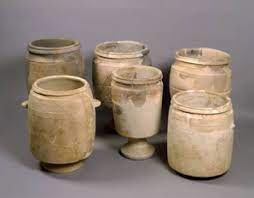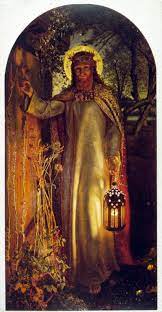Today was the funeral of a friend. Earlier in the day, I had attended a breakfast and Bible study with a few friends, and we had looked at the first of Jesus' signs in John's gospel. Most people will know the story. Jesus was invited to a wedding with His disciples. His mother was there and seemed to have something of an organising role. All was going well until disaster suddenly struck. The rather meagre provision of wine, probably all this poor small family could afford, had run out. One can imagine a crowd of strong healthy fisher folk rapidly draining the wine skins dry.
So the appeal goes out to Jesus from His mother: "Jesus, do something about it!" This was not a plea to nip down to the village shop and buy another flagon of wine. This might have felt to Jesus a bit like the devil's temptation to do some miraculous miracle to kick start His ministry, but Jesus would have none of that. However, Jesus' compassion was stirred to do something for these newly weds.
Of course, when you generously invite Jesus into your situation, miracles do happen, and happen with joyous abundance. Mary carefully tells the servants to quietly do all that Jesus asks of them, and the command goes out to fill six enormous stone water vessels each holding twenty to thirty gallons.
One can imagine the complaints as the servants laboriously wind up that amount of water by hand from the local well. "What on earth for?" they ask.
What trepidation as the servants bring the water into the feast! What will be the reaction of the Master of ceremonies? Remember the bouquet of a really good wine? This was what was wafting through the feast now. "The good has been left till last!" Jesus blesses this couple with His extravagant life-affirming presence, and His gift of the very best wine.
So, how did thoughts of a miraculous wedding present and a joyous banquet fit in with the sad and solemn funeral service? The answer of course is that Jesus was here as well, very much in the centre of everything that was going on. Tears well up. Jesus himself wept when He met Mary on the occasion of the death of Lazarus. Bereavement is a long and painful process, which we all have to go through at some stage in our lives.
However, with Jesus, death is not the end, He is the one who broke out of the tomb on Easter morning, and He is the one who will personally invite us to the heavenly banquet, to the wedding feast of the bride and the Lamb, spoken about in the book of Revelation.
Why be content with anything less for your life than Jesus as your personal friend? Invite Him in to your life now.
He stands at the door and knocks.
Finally a poem by Malcolm Guite.
Here's an epiphany to have and hold,
A truth that you can taste upon the tongue,
No distant shrines and canopies of gold
Or ladders to be clambered rung by rung,
But here and now, amidst your daily living,
Where you can taste and touch and feel and see,
The spring of love, the fount of all forgiving,
Flows when you need it, rich, abundant, free.
Better than waters of some outer weeping,
That leave you still with all your hidden sin,
Here is a vintage richer for the keeping
That works its transformation from within.
'What price?' you ask me, as we raise the glass,
'It cost our Saviour everything he has.'
Malcolm Guite Sounding The Seasons





